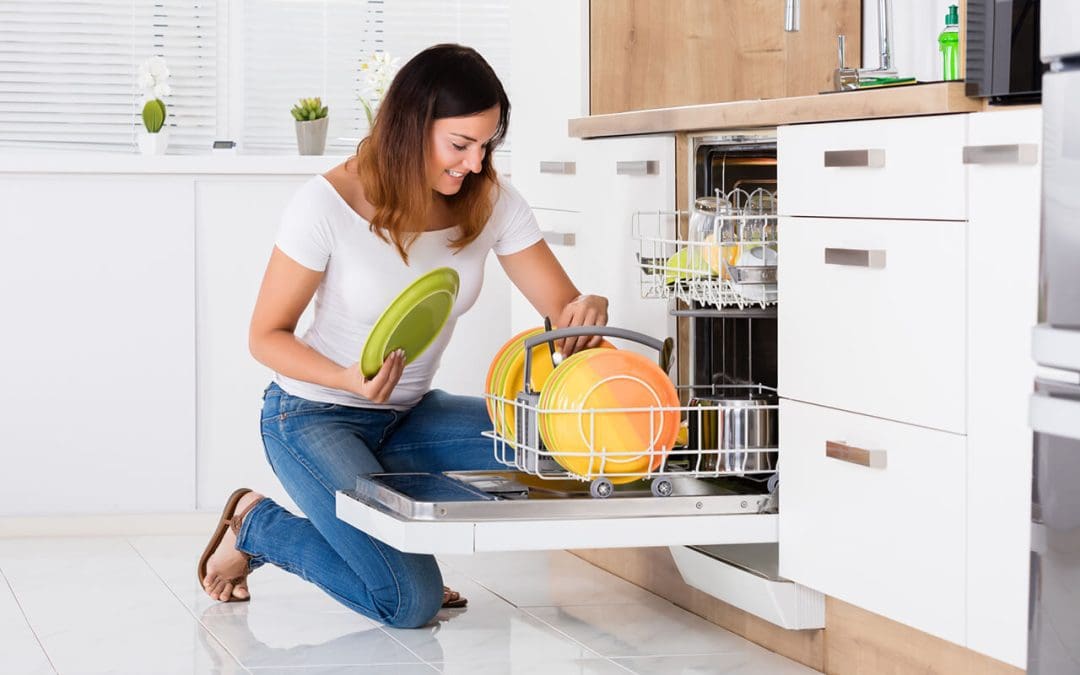An optimally functioning dishwasher is a game-changer in the kitchen. When used efficiently, it saves time and money. Here are our top tips for how to save money using your dishwasher.
Optimize Your Loading Technique
Loading your dishwasher correctly is crucial for cleanliness and efficiency. Make sure each dish has enough space for water and detergent to reach it. Overloading will lead to poor cleaning results, requiring a second wash cycle, which wastes water, energy, and money. Plates should face the center, and larger items like pots and pans should be placed on the sides or back, allowing water to circulate freely. Mix utensils with some facing up and others down to prevent nesting.
Save Money Using Your Dishwasher with the Right Detergent
Not all dishwasher detergents are created equal. Using a high-quality detergent improves cleaning efficiency and reduces the need for pre-rinsing and rewashing. Overusing detergent may lead to residue on your dishes and inside your machine, requiring additional cleaning and potentially causing long-term damage. While it may be tempting to use detergent pods since they’re pre-measured for optimal performance, it’s usually more cost-effective to use powder detergent.
Take Advantage of Eco-Friendly Settings
Most modern dishwashers have eco-friendly settings that use less water and energy. These settings might have longer wash cycles but will save money on utility bills. The eco or energy-saving mode typically uses lower temperatures and less water, making it a smart choice for everyday dishwashing.
Run Full Loads
Instead of running your dishwasher half-full, wait until you have a full load. Each cycle uses about the same amount of water and energy regardless of the number of dishes inside. Running fewer, fuller loads will reduce the number of cycles, saving water, electricity, and detergent costs.
Regular Maintenance
A well-maintained dishwasher runs more efficiently and lasts longer. Regularly check and clean the filter to prevent clogs and ensure proper water flow. Wipe down the door seals and clean the spray arms to remove buildup that could impede performance. Running an empty cycle with a cup of vinegar every few months will help keep your dishwasher fresh and free from mineral deposits.
Air-Dry When Possible
Using the heat-dry function on your dishwasher significantly increases energy usage. If you have the time, air-dry your dishes. Many dishwashers have the option to turn off the heat-dry setting, or you can simply open the door after the final rinse cycle to let the dishes dry naturally. This small change could lead to noticeable savings on your energy bill.
Use Hot Water Wisely to Save Money Using Your Dishwasher
Setting your water heater at the right temperature can impact your dishwasher’s efficiency. The ideal temperature for washing dishes is around 120 degrees Fahrenheit. Higher temperatures waste energy, while lower temperatures may not clean effectively. Additionally, running your kitchen faucet until the water is hot before starting the dishwasher helps it start with hot water, improving cleaning efficiency from the get-go.
Choose the Right Dishwasher
If you’re in the market for a new dishwasher, consider models with high energy efficiency ratings. Look for ENERGY STAR-certified appliances that use less water and energy without compromising performance. Investing in a more efficient dishwasher will lead to long-term savings on your utility bills.
By following these expert tips, your dishwasher will run efficiently, saving you time, energy, and money.
Save Money Using Your Dishwasher FAQs
Do I need to rinse my dishes before putting them in the dishwasher?
Generally, there’s no need to pre-rinse dishes. Modern dishwashers and detergents are designed to handle food residue. Just scrape off large food particles to prevent clogs.
Is it more economical to wash dishes by hand?
No, dishwashers typically use less water and energy than hand-washing, especially when running full loads. Dishwashers are designed to be more efficient and use less water per cycle.
Can I use regular dish soap in my dishwasher?
No, regular dish soap creates too many suds and can cause your dishwasher to overflow. Always use detergent specifically designed for dishwashers.
What should I do if my dishes aren’t coming out clean?
Check the loading pattern, detergent amount, and the cleanliness of the filter and spray arms. Confirming that there is no blockage and using the right settings will improve cleaning performance.
CheckPoint Property Inspections provides home inspection services to Burlington, Vermont, and surrounding areas. Contact us to schedule an appointment.

